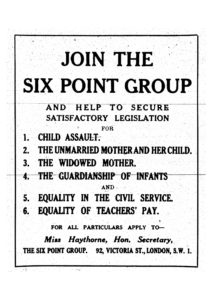
One hundred years ago a group of pioneering women gathered together to campaign for change in six key areas. Their aims, which ranged from equal rights of guardianship for married parents to satisfactory legislation on child support, may not seem radical today. However, at the time the Six Point Group was at the forefront of campaigns for gender equality. Their work has shaped the modern world – but we still have a long way to go. A century on, Time and Tide hosted another group of pioneering women to discuss campaigns for women’s rights in the modern day and what we can all do to help.
The event kicked off with an eye-opening discussion on how the pandemic has impacted women, presented by Felicia Willow, interim CEO of the Fawcett Society. The group, which takes its name from suffragette Millicent Fawcett, is the UK’s leading membership charity which campaigns for women’s rights and gender equality.
Although many of us have learned the hard way just how complex and devastating the impact of the COVID-19 pandemic can be, Felicia drew particular attention to how it has impacted women who were already struggling financially. Sectors like retail and hospitality tend to be dominated by women and have been devastated by the pandemic in comparison to more male-dominated industries like construction.
Not only does this have a practical impact on women’s ability to afford things like housing and adequate food, but the second panellist, Denise Fowler, reminded us how lack of financial independence can lead to women being forced to remain in abusive or unhappy living situations. Denise is CEO of Women’s Pioneer Housing and works with women who cannot afford to live on their own due to the staggering costs of rent, especially in major cities. It is astounding that there isn’t a single region in England where a woman on an average salary can afford to rent a house. In comparison, men on an average salary can afford to rent a house everywhere but London. By using shocking statistics like this, Fowler opened the eyes of the people listening to the real challenges that women face in trying to get independence and financial security across the country.
The panellists all gave honest accounts of how gender roles continue to dominate the lives of women, particularly around the issue of childcare and the impact of school closures. Women are still expected to bear the brunt of home-schooling across the country as the pandemic closes schools, forcing them to take time off work and forgo their careers to take care of children – an issue that was on the forefront back when the Six Point Group was founded in 1921.
The event concluded with a talk by Nadia Whittome, the current youngest member of Parliament and Labour MP for Nottingham East. She reminded listeners of our own personal roles, noting that politics is not just done in Parliament and emphasising the importance of grassroots action throughout history in championing gender equality.
Crucially, Nadia emphasised that cisgender and transgender women’s rights are not at odds, and both groups suffer under the patriarchy. The topic of transgender rights remains controversial in some feminist circles, so it was refreshing to hear such a prominent activist giving unequivocal support to the cause.
Indeed, intersectionality was at the heart of the event. It was frequently noted that some of the most vulnerable women who need the help of feminist organisations themselves are also in other disadvantaged groups – migrant women deported back to areas where sexual violence is common; disabled women struggling to find accessible housing; Bangladeshi and Pakistani women making on average significantly less money than white women, who already make less than white men. Each speaker gave important reminders of the variety of privilege and discrimination that exists within the broad umbrella of ‘women’.
The event highlighted just how far we need to go for true gender equality. Although much progress has been made since the Six Point Group first drafted their list of aims, the COVID-19 pandemic has pushed back equality by several years with women suffering financially, emotionally, and politically. However, the eloquence and intelligence of the speakers leaves you with a feeling of hope – if these are the people fighting for gender equality you can’t help feeling the cause is in good hands.
By Simone Fraser. Simone is an MA Journalism student at City, University of London. You can watch a recording of this panel on our Agendas for Change page.